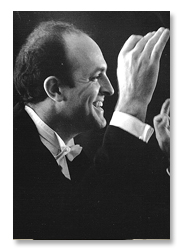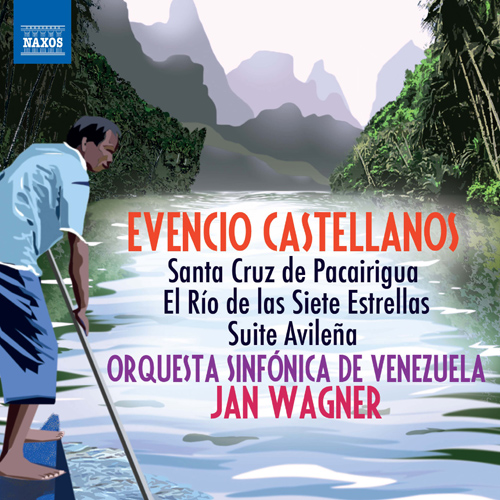CASTELLANOS, E.: Santa Cruz de Pacairigua / El rio de las siete estrellas / Avilena Suite (Venezuela Symphony, J. Wagner)
Evencio Castellanos belonged to the generation of Venezuelan composers who established a new nationalistic style in the first half of the 20th century. One of his best known works, Santa Cruz de Pacairigua pays homage to the construction of a church in Guatire, near Caracas, quoting popular dance rhythms and melodies, as well as a Venezuelan medieval carol. El Río de las Siete Estrellas (The River of the Seven Stars), inspired by a poem about the Orinoco River, describes events of pre-colonial Venezuelan history leading up to the country’s independence in 1821. The Suite Avileña, a compilation of scenes alluding to the coastal mountain of El Ávila, borrows from popular songs and Christmas carols, and features the cuatro (a four-stringed version of the European classical guitar) and maracas, two of the most typical Venezuelan folk instruments.
Tracklist
Wagner, Jan (Conductor)
Wagner, Jan (Conductor)
Wagner, Jan (Conductor)
Wagner, Jan (Conductor)
Wagner, Jan (Conductor)
Wagner, Jan (Conductor)
Wagner, Jan (Conductor)
Wagner, Jan (Conductor)
Wagner, Jan (Conductor)
Wagner, Jan (Conductor)

Jan Wagner launched his conducting career after winning first prize at the 1995 Nicolai Malko International Conductorsʼ Competition in Denmark. Between 1997 and 2002 he was Principal Conductor of the Odense Symphony Orchestra and has appeared with most of the leading Scandinavian and European orchestras, including the Danish National Radio Symphony, the Royal Stockholm Philharmonic, the Helsinki Philharmonic, the Royal Philharmonic, the Frankfurt Radio Symphony, the Stuttgart Radio Symphony, and the Hallé Orchestra. Wagner has also appeared with the Los Angeles Philharmonic, New Jersey Symphony, the Minnesota Orchestra, and the Orquesta Sinfónica de Venezuela, with which he has maintained a close affiliation since 1996. Jan Wagner is currently Professor of Music at Shenandoah Conservatory of Music and is a graduate of the Vienna Academy of Music. He won first prize at the 1994 Leopold Stokowski International Conducting Competition and was a recipient of the 1994 Conducting Prize at the Aspen Music Festival, where he served as assistant conductor in 1995.
Evencio Castellanos may well be considered one of the most significant and representative Venezuelan nationalistic composers of the twentieth century. Born into a family of active musicians, he received his first musical instruction in organ from his father, Pablo Castellanos, and piano lessons from Rafael González Guía in Caracas. At an early age he began to assist his father by playing organ in various churches in Caracas and eventually became the organist of the Cathedral of Caracas, a position his father held for many years. His first formal training in composition began at the Escuela de Santa Capilla, the founder of which was Vicente Emilio Sojo, perhaps the most imposing musical figure in Venezuelan musical history, who exerted a lasting influence over a whole generation of Venezuelan composers such as Gonzalo Castellanos-Yumar (brother of Evencio), Antonio Estévez, Ángel Sauce, Antonio Lauro, Carlos Figueredo, Blanca Estrella, José Clemente Laya, José Luis Muñoz, Raimundo Pereira, Modesta Bor and Inocente Carreño.
After furthering his musical studies in New York at the Dalcroze School of Music, Evencio Castellanos embarked on a dynamic and active musical life in Caracas, becoming a member of the Orquesta Sinfónica de Venezuela (of which Sojo was one of the founders in 1930) and, eventually, vice-president of its board of directors. In addition to his own prolific work as a composer he also enjoyed a long association with the Escuela Superior de Música, teaching composition and ultimately becoming its director between 1965 and 1972. The work and influence of Castellanos as a conductor cannot be underestimated. He was the founder and director of the Collegium Musicum of Caracas and the orchestra of the Universidad Central de Venezuela. His association and work with the Experimental Orchestra of the Orquesta Sinfónica de Venezuela wielded lasting influence over the creation of the current and vibrant movement of youth orchestras in Venezuela founded by José Antonio Abreu.
Castellanos’s compositional style can perhaps best be divided into works that are emblematic of the nationalistic influences set forth by Sojo, on the one hand, and on the other, sacred compositions influenced by his religious upbringing and life-long religious devotion. His major orchestral works are permeated with a nationalistic aesthetic and are infused with folkloric elements, as are most of his instrumental and chamber works. His various sacred choral and organ compositions are more representative of his religious orientation.
© Jan Wagner
































